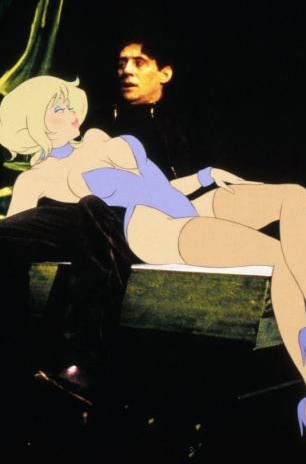Sunday, July 12, 1992
COOL WORLD. Written by Michael Grais and Mark Victor. Music by Mark Isham. Directed by Ralph Bakshi. Running time: 102 minutes. Rated Mature with the B.C. Classifier's warning: "some violence, occasional suggestive scenes, coarse language and swearing.
FORGET SATURDAY MORNING.
Ralph Bakshi's cartoon style continues to be Saturday night raw. Cool World, from the artist who pioneered "adult animation," is the kind of picture designed to gross out the family audience.
Cool World is not Toontown. Though Bakshi's anarchic film features live performers interacting with cartoon characters, don't confuse it with 1988's Disney-financed Who Framed Roger Rabbit.
The earlier picture was a polished, Establishment-approved product. Well-mannered, it was a wonderful bit of cartoon nostalgia, perfectly tuned to suburban filmgoers.
When the deliciously exaggerated Jessica Rabbit purred (with Kathleen Turner's voice), "I'm not bad . . . I'm just drawn that way," she was assuring us that it would be a safe, comfortable ride for the whole family.
Cool World's catchphrase is "Holli Would if she could."
In the ads, the more realistically proportioned Holli strikes the Second World War pin-up pose made famous by Betty Grable.
The line is both a promise and a warning. A "doodle," the miniskirted Holli craves the sensual pleasures that come with being "real."
To become real, though, she must break "the oldest law of Cool World" and have sex with a human. Only in the shudder of orgasm will she metamorphose from a line drawing to live-action actress Kim Basinger.
Be aware that while Roger Rabbit hopped through the front gate of the Disney studios arm-in-arm with Mickey Mouse, Cool World trucks out of the back door of a seedy Las Vegas comic shop. Bakshi's vision aspires to be edgy, underground and inner city.
His Cool World is a film noir universe inhabited by doodles who smoke, drink and urinate on one another. Its top cop, Frank Harris (Brad Pitt) is a 'noid — a live human — who crossed over during a moment of intense personal pain sometime in 1945.
To achieve her own cross-over dream, Holli has been manipulating a modern-day underground comic artist named Jack Deebs (Gabriel Byrne). He imagines that his successful Cool World comic books are his own creation, right up to the moment that Holli reaches out and drags him into his own drawings.
The crisis comes when Holli's transformation tears a hole in the doodle-'noid continuum, one that poses a threat to both realms. Will hero Harris be up to the task?
A unique artist, Bakshi blends elements of in-your-face autobiography with animation savvy and cinematic satire to produce a feel-creepy nightmare comedy. A patchwork companion to his 1973 masterpiece Heavy Traffic, Cool World is the story of Holli Would, who's bad . . .
. . . and she's drawn that way.
The above is a restored version of a Province review by Michael Walsh originally published in 1992. For additional information on this archived material, please visit my FAQ.
Afterword: Celebrating his 65th birthday today (May 12), Gabriel Byrne has made a career playing brooding, occasionally mythic, and sometimes creepy characters. Dublin-born, the former seminarian — an Irish-Catholic, he studied for the priesthood — made his feature film breakthrough playing Uther Pendragon, the sexually transgressive father of King Arthur in director John Boorman's Excalibur (1981). He built his resume in European projects that gave him the opportunity to discover a new world (playing the title role in the 1985 TV miniseries Christopher Columbus), and explore inner worlds (as Lord Byron in Ken Russell's hallucinatory 1986 feature Gothic). The Coen brothers gave Byrne his first American starring role, casting him as a prohibition-era mobster in their 1990 feature Miller's Crossing, and Gillian Armstrong brought him to B.C. to play Winona Ryder's suitor in her 1994 adaptation of Little Women.
His career has included such morally-challenged characters as a government master assassin (in John Badham's 1993 Point of No Return), Satan (in Peter Hyams's 1999 End of Days), and an international banker (in Costa-Gavras's 2012 Capital). None of them, though, are quite like the creatively-conflicted Jack Deebs, the part he plays in Ralph Bakshi's ninth and (to date) final feature Cool World. The picture was not a commercial success, and animation historians have reported that it was a troubled project. The picture remains a fascinating footnote in actor Byrne's eclectic filmography.
See also: For more on the life and work of adult animation pioneer Ralph Bakshi, check out my 1978 interview with him. The Reeling Back archive also contains reviews of most of his films, including Fritz the Cat (1972); Heavy Traffic (1974); Wizards (1977); The Lord of the Rings (1978); American Pop (1981) and Fire and Ice (1983).
